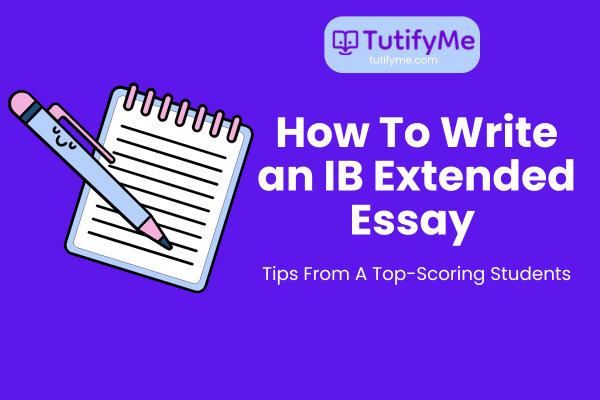The International Baccalaureate (IB) Extended Essay is a crucial part of the IB Diploma Programme. It gives students a chance to explore a topic they are passionate about in-depth and develop critical thinking, research, and writing skills. This blog will provide simple and actionable tips from a top-scoring student to help you ace your IB Extended Essay.
What Is the IB Extended Essay?
The IB Extended Essay is a 4,000-word research paper that students must complete as part of their IB Diploma. It’s an opportunity to investigate a topic of your choice within a specific subject area. The essay requires independent research, careful planning, and clear writing. Your Extended Essay can help showcase your ability to think critically and independently. Universities value this skill, so take it seriously!
Top 10 Tips on How to Write IB Extended Essay
Step 1: Understand the Requirements
Before you begin, it’s essential to understand what is expected of you. The essay should be approximately 4,000 words, and you need to develop a clear research question. It is crucial to use credible sources and cite them properly. The essay must be attach to one IB subject area, such as History, Biology, or English. Additionally, it will be graded on criteria like focus, research, analysis, and presentation.
Reading the IB Extended Essay guide provided by your school is highly recommended. This will give you a clear understanding of the format and grading criteria, ensuring you meet expectations from the start.
Step 2: Choose a Topic You Love
Selecting the right topic is important for success. Choose something you are genuinely interested in, as this will make the research and writing process more enjoyable. For example, if you love History, you might explore “The Impact of the Industrial Revolution on Women in England.” Alternatively, if Biology is your passion, you could investigate “The Effects of Acid Rain on Plant Growth.”
Your topic should be specific—not too broad or narrow. Instead of a general theme like “World War II,” focus on something detailed, such as “The Role of Codebreakers in World War II.” Discussing your ideas with a teacher or supervisor can also help refine your topic.
Step 3: Develop a Research Question
A strong research question is the backbone of a good IB Extended Essay. It should be clear, focused, and answerable through research. For example, instead of a unclear question like “Why is renewable energy important?” consider something more specific like “What are the environmental benefits of renewable energy in small island nations?”
Your research question should act as a guide throughout your essay. Ensure it aligns with IB standards by consulting your supervisor or teacher for feedback.

Step 4: Create a Plan and Timeline
Writing a 4,000-word essay can feel stressing. Breaking the process into smaller tasks and setting deadlines for each will make it more manageable. Start by choosing your topic and research question. Then, conduct research, write an outline, and draft each section of your essay. Finally, allocate time for revisions and editing.
Starting early is essential. Delay can lead to unnecessary stress, so sticking to your timeline is critical. Use tools like calendars or apps to track your progress and stay organized.
Step 5: Conduct Thorough Research
Research is the foundation of your essay. Use reliable sources such as academic journals, books, and reputable websites. Take detailed notes and organize them by theme to simplify the writing process. Keeping track of your sources is also essential to ensure proper citation.
Avoid using Wikipedia as a primary source, but it can be a good starting point to find references. Your school library and online academic databases are valuable resources that should not be overlooked.
Also Read: Is Online Education Aiding Digital Divide?
Step 6: Write a Clear Outline
An outline helps structure your essay and ensures you stay on track. A typical IB Extended Essay outline includes an introduction, body paragraphs, and a conclusion. In the introduction, introduce your topic and research question, explain its significance, and state your thesis.
The body should be divided into sections based on themes or arguments. Each section should present evidence, followed by your analysis. The conclusion should summarize your findings, directly answer your research question, and reflect on the broader indication of your research.
Use headings and subheadings to organize your essay and make it easy to read. This approach will also help you maintain focus on your research question throughout the essay.
Step 7: Write Your First Draft
The first draft is where you put your ideas into words. Don’t aim for perfection; focus on getting your arguments down on paper. Write in a formal, academic tone and use simple, clear language. Ensure that all sources are cited to avoid plagiarism.
Taking breaks during the writing process can help you maintain a fresh perspective. Remember, the first draft is just a starting point, and revisions will improve its quality significantly.

Step 8: Revise and Edit
Editing is just as important as writing. Review your essay for clarity, consistency, and grammar. Check for spelling and punctuation errors and ensure your arguments are logical and well-supported. Make sure your essay directly answers the research question and aligns with the IB criteria.
Ask a teacher, friend, or family member to review your essay and provide feedback. Their input can help you identify areas for improvement that you may have missed.
Step 9: Format and Submit
Proper formatting is essential for a professional-looking essay. Follow the IB guidelines for font size, spacing, and citations. A readable font like Times New Roman (12 pt) is recommended, and the text should be double-spaced. Include a title page with your research question and word count.
Before submitting, double-check the requirements and submission deadline to ensure everything is in order. Attention to detail can make a big difference.
Also Read: Importance of Extra-curricular Activities For Students
Final Tips for Success
Stay organized by using tools like Google Drive or Evernote to keep your notes and drafts in one place. Don’t hesitate to ask your supervisor for guidance when needed. Maintaining healthy routine and taking breaks will help you stay focused and productive.
Review high-scoring IB Extended Essays for inspiration and insights into what makes a strong essay. Finally, remember that the IB Extended Essay is an opportunity to showcase your skills and passion for learning.
Why Choose TUTIFYME for IB Extended Essay Help?
At TUTIFYME, we offer expert guidance for students working on their IB Extended Essays. Our tutors provide personalized support, helping you develop a strong research question, improve your writing skills, and understand IB requirements and grading criteria.
Sign up today to get the support you need to succeed in your IB Extended Essay journey!
By following these simple yet effective tips, you can write a high-quality IB Extended Essay and achieve top marks. Good luck!
Also Read: Dos and Don’ts for Studying A-Level Business Studies
Short Questions and Answers about IB Extended Essay.
Q. What is the IB Extended Essay, and why is it important?
A. The IB Extended Essay is a 4,000-word research paper that is part of the IB Diploma Programme. It helps students develop research, analytical, and writing skills valued by universities.
Q. How do I choose a good IB Extended Essay topic?
A. Select a topic you are passionate about and ensure it is specific, manageable, and aligns with one IB subject area.
Q. What are some examples of IB Extended Essay questions?
A. Examples include “How did the Industrial Revolution impact women in England?” or “What are the effects of acid rain on plant growth?”
Q. How long does it take to write the IB Extended Essay?
A. It typically takes several months, including research, drafting, and revising. Start early and follow a timeline to avoid last-minute stress.
Q. How do I structure an IB Extended Essay?
A. An essay typically includes an introduction, body paragraphs organized by themes or arguments, and a conclusion.
Q. What are common mistakes in writing the IB Extended Essay?
A. Common mistakes include unclear research questions, insufficient analysis, and improper citations.
Q. Can I get help with my IB Extended Essay?
A. Yes, TUTIFYME offers personalized guidance to help students succeed in their IB Extended Essays.
Q. What citation style should I use for the IB Extended Essay?
A. The IB allows various citation styles, but consult your school’s guidelines or your supervisor for the preferred format.
Q. What is the passing grade for the IB Extended Essay?
A. The IB Extended Essay is graded on a scale of A to E, and you must achieve a minimum of a D to pass.
Q. How can I make my IB Extended Essay stand out?
A. Focus on a unique research question, use credible sources, and ensure your analysis is insightful and well-supported.

